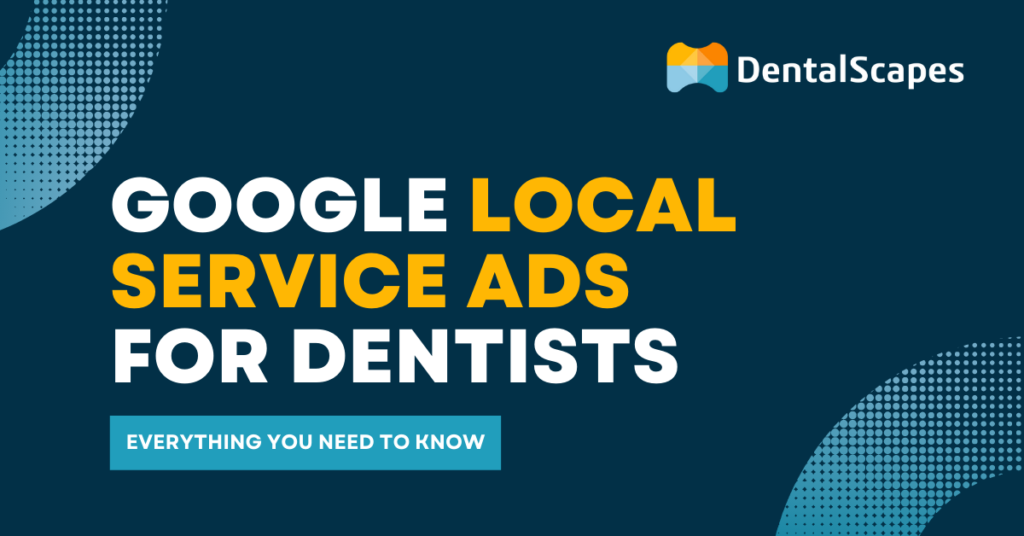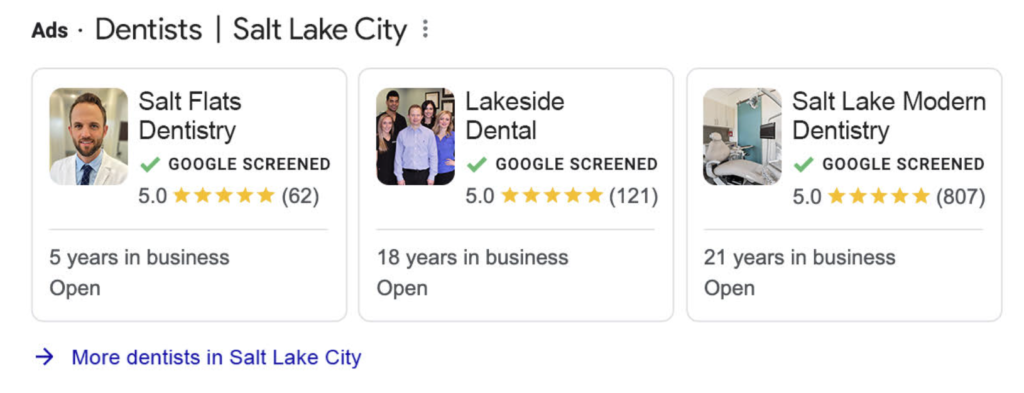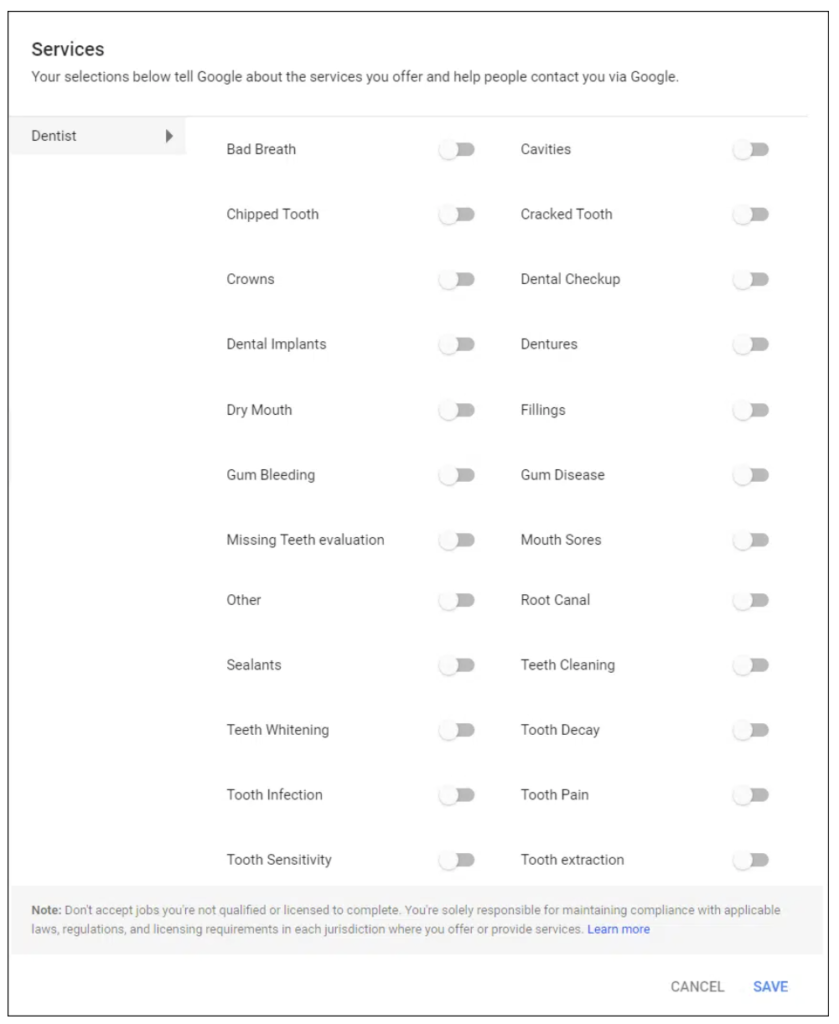Google Opens Local Service Ads (LSA) to Dentists

It’s finally happened. After years of anticipation, Google has finally opened its popular Local Service Ads (LSA) ad product to dentists. This is, to be frank, a big freaking deal. Long available to other local service providers like attorneys, plumbers, and electricians, Google LSAs are a transformational “pay-per-lead” ad format that can quickly and affordably drive new patient appointments for dental practices. LSA ads also stand out for their ability to build trust with potential patients (we’ll get into that in a minute).
In this blog post, we’ll walk through everything dental practices need to know about Google LSAs — and how your practice can take advantage of this innovative ad platform.
Google Local Service Ads are a huge opportunity for dentists wanting to generate more new patient appointments.
What Are Local Services Ads (LSAs)?
Google LSA (Local Services Ads) is a platform that allows local businesses (like dental practices) to advertise their services directly on Google search results. Sound familiar? Here’s the real kicker — LSAs appear at the very top of the page, before even organic search results, making them highly visible and effective in attracting potential patients.
Google Local Service Ads also make it easy for potential patients to get in touch with your practice — with a single click on the LSA ad itself, they can call or message your office directly.
Here’s how LSA for dentist ads appear “in the wild”:

Pay-per-Lead Pricing
Unlike Google pay-per-click (PPC) ads, Google Local Services Ads utilize a pay-per-lead (PPL) model, in which dental practices pay per qualified phone call or message. The word “qualified” is important here — with Google LSAs, a dental practice is only charged for phone calls and messages from patients specifically inquiring about a service offered by the dentist listed.
Components of Local Service Ads for Dentists
What’s included in a Google LSA ad for a dental practice? There are four primary components:
- Photo
- Google verification indicator (“Google Screened” designation)
- Google reviews (average rating and total number)
- Additional business information
In this section, we’ll dig into each of these components of Google LSA for dentists.
Photo
Each Google LSA ad for dentists includes a prominent photo of the provider(s), staff, and/or practice office. The selection of a photo for a Google LSA is tremendously important.
Google Verification
Another thing that sets Google LSA ads apart from traditional PPC and other ad formats is verification. Before running Google LSA for dentists, a dental practice must submit information to Google and be “verified.” Under the verification process, a dentist applying to run Google Local Service ads must submit:
- Proof of liability insurance
- State business registration
- NPI registration
- Information to complete a background check (in some cases)
Dental practices verified by Google are approved to dentist LSA ads, which include a fancy green checkmark and a “Google Screened” designation, instantly adding credibility and building trust with potential patients.
Google Reviews
In addition to the “Google Screened” designation, LSA ads for dentists also include the dental practice’s average Google review rating and number of reviews, providing potential patients with yet another opportunity to vet providers. A dental practice’s Google reviews (both the average rating and total number) are also a significant factor in determining the likelihood that a Google LSA ad will appear in the top three positions (we’ll talk more about ranking factors a little later).
Additional Business Information
With Google LSAs, a dental practice also has the option to highlight other information for potential patients. By default, an LSA ad displays the number of years the practice has been in business, but dentists may also have the option to spotlight other information (e.g., “family-owned,” “veteran-owned,” etc.).
What Services Can Dentists Advertise with Google LSAs?
One of the biggest benefits of running LSAs is that it allows dentists to promote specific clinical services that are most relevant to their practice. When setting up your LSA campaign, you can choose from a lengthy list of dental services and oral health conditions, including but not limited to: dental checkup, cavities, crowns, cracked tooth, dentures, teeth whitening, tooth pain, teeth cleaning, root canal, and more.

The targeting feature gives dentists far more control over the types of leads they receive from LSAs and means that your office staff won’t have to waste time handling inquiries for services that may not be offered.
How Much Do Google LSAs for Dental Practices Cost?
Unlike Google PPC ads, where you pay per click, Google LSAs operate on a pay-per-lead basis, meaning you only pay for qualified phone calls and messages. Within the Google LSA platform, an advertiser can designate what they’re willing to pay per lead, as well as what they’re willing to pay per day.
Keep in mind that just because you indicate you’re willing to spend, for example, $100 per day on Local Service Ads, doesn’t mean that you will necessarily spend that much. The frequency at which Google displays a dentist’s LSA ads depends on many factors, including local search volume and other factors that we’ll cover in the next section.
How Do You Optimize Google LSA Ads to Improve Performance?
Google considers multiple factors when determining which dental practices’ LSAs will display in the top three results on the search engine results page (SERP). Factors that can impact your practice’s LSA performance include:
- Response rate — How quickly you respond to LSA inquiries. Unanswered phone calls or ignored messages can negatively impact your Google LSA performance. In some cases, you might stop receiving LSA leads entirely.
- Review rating — The better your average Google reviews rating, the more likely it is that your dental practice’s LSAs will run near the top. The overall number of Google reviews you have can also influence your LSA performance.
- Review rate — Businesses can send patients a review request directly within the Google LSA platform after an appointment is scheduled. The rate at which patients respond to these requests can affect your practice’s LSA visibility on the SERP.
- Scheduling rate — Google looks at the percentage of leads that ultimately schedule an appointment as a measure of quality and experience. The more LSA leads that your office ultimately converts into new patients, the better your Local Service Ads are likely to perform.
- Complaints — Bad experiences reported by potential patients can negatively impact LSA performance, causing practices’ ads to be de-prioritized or disappear altogether.
- Lead dispute rate — Advertisers can file a dispute with Google regarding leads that did not meet their specified criteria (e.g., if a potential patient was inquiring about a service not listed by the practice). While this can be helpful in controlling costs, overuse may suggest to Google that the practice is trying to game the system and the LSA account may be penalized.
As you improve these metrics, your practice’s Google LSAs will run more often and perform better, increasing your return on investment (ROI). Paying attention to these factors is especially important as competition increases and more dentists begin taking advantage of Local Service Ads.
How to Get Started with Google LSAs for Dentists
Google LSAs are a huge opportunity for dentists to generate qualified leads and new patient appointments at an affordable cost. While the LSA platform doesn’t allow for the same degree of control as Google Ads (the platform for managing Google PPC for dentists), there are still many things that you or your dental marketing agency can do to improve performance.
To get started, visit the Google Local Services Ads website, or talk with the dental marketing professionals at DentalScapes. We’re ready to help however we can. Request a FREE strategy call today and let’s connect!
